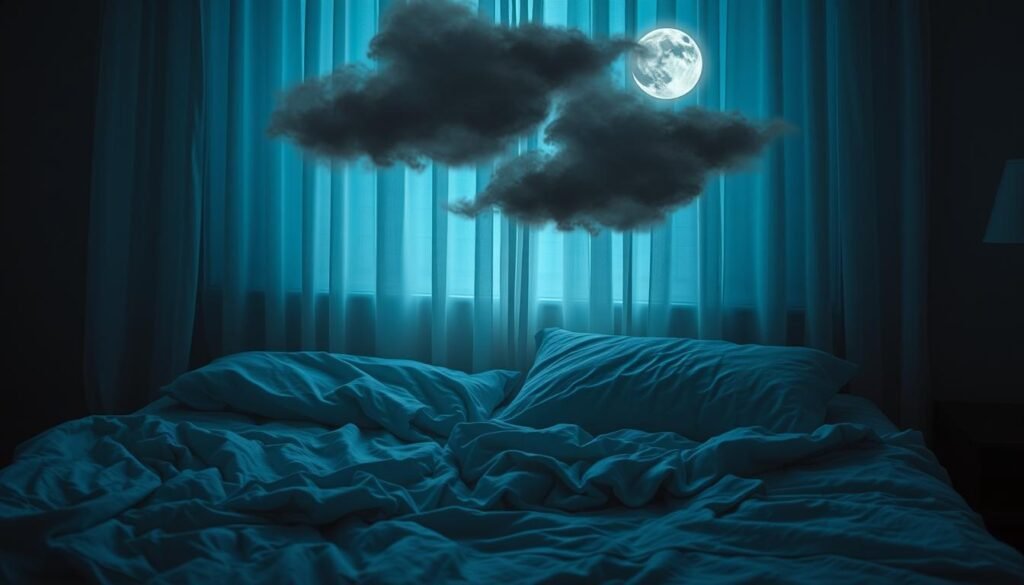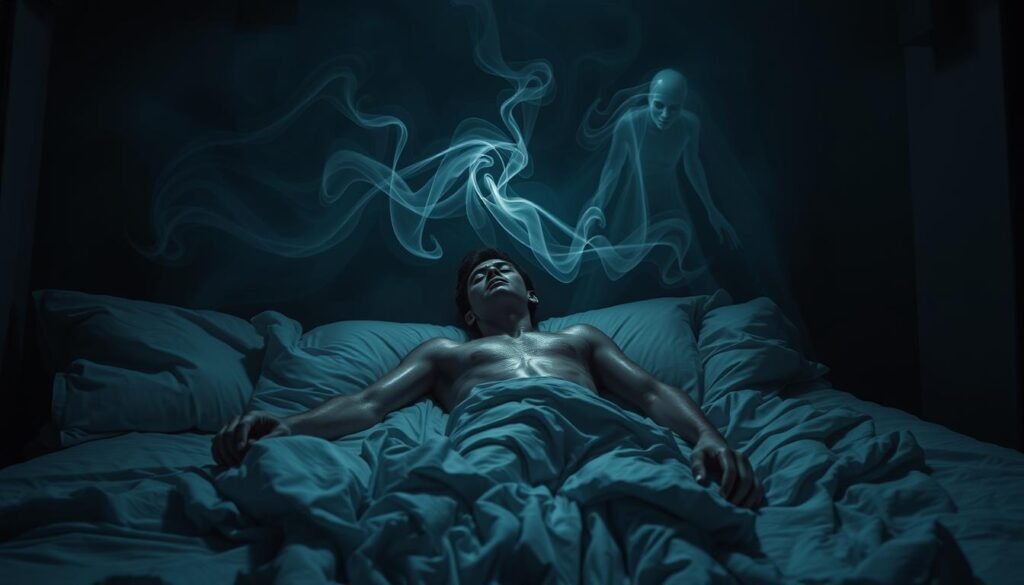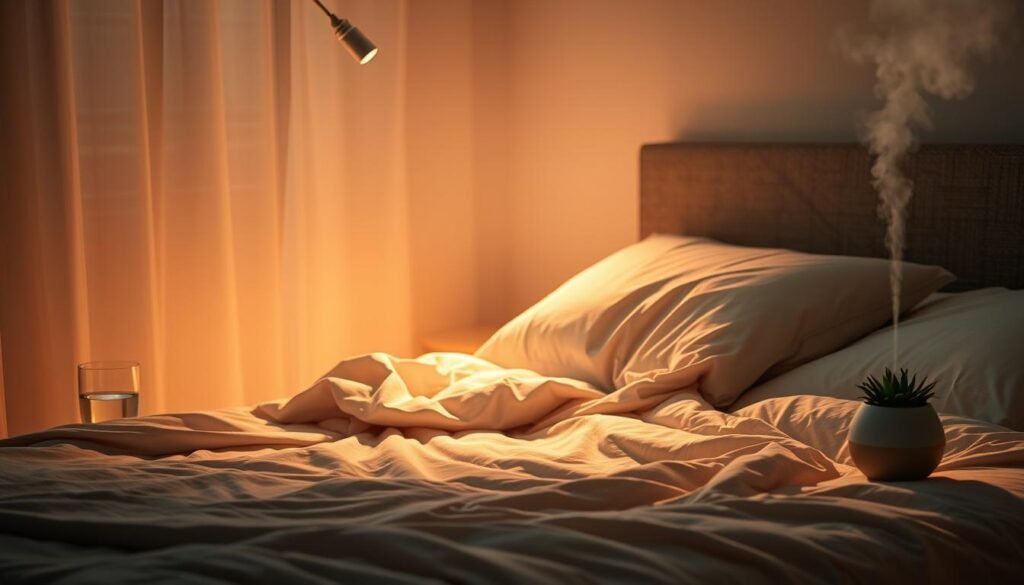About 41% of people will have night sweats at some point. This symptom is not always from medical issues like infections or hormonal shifts. It’s crucial to note the night sweats anxiety correlation. Anxiety doesn’t only affect the mind. It shows up in the body too, causing poor sleep and discomfort. Knowing how anxiety leads to night sweats can help in tackling the problem and bettering our health.
Key Takeaways
- Anxiety can lead to increased sweating during both the day and night.
- Understanding the connection between anxiety and night sweats can enhance sleep quality.
- Night sweats are a common symptom affecting many individuals globally.
- Physical symptoms of anxiety often include sweating and restlessness.
- Seeking help for anxiety can alleviate night sweats and improve overall comfort.
Understanding Night Sweats
Night sweats are when you sweat a lot during sleep. This sweating isn’t because of the room being too warm. These sweats can make you uncomfortable and mess up your sleep. It’s important to know about the body changes that cause night sweats. These changes could be from hormone shifts or stress.
Many things can make you have night sweats. Feeling anxious is a common cause. When you’re stressed, your body makes hormones like cortisol. This can lead to what’s called stress sweat.
Bedroom temperature and hormones changing, especially during menopause, are also to blame. Choices like drinking caffeine or alcohol can make it worse. For more info, check out this link.
Some medicines might cause night sweats too. Antidepressants and drugs that affect hormones are known for this. Stopping alcohol or drug use suddenly can also cause sweats at night. And, disorders like obstructive sleep apnea might be involved.
To reduce night sweats, try keeping your bedroom cool. Work on ways to relax and avoid caffeine and alcohol before bed. By understanding night sweats and what causes them, you can find ways to feel better.
| Cause of Night Sweats | Details |
|---|---|
| Anxiety | Physiological changes linked to stress hormones. |
| Hormonal Changes | Common during menopause and may include hot flashes. |
| Medication Side Effects | Includes antidepressants and hormone-blocking drugs. |
| Environmental Factors | Room temperature and bedding choices can affect severity. |
| Sleep Disorders | Conditions like obstructive sleep apnea contribute. |
What Causes Night Sweats?
Night sweats happen for various reasons. Understanding the causes of night sweats is key to managing them well. One main cause is the room’s temperature. If your room is too warm, you might sweat a lot at night. This can disturb your sleep.
Hormonal changes also play a big part in night sweats. For example, menopause can cause hot flashes and night sweats. Low testosterone and hyperthyroidism are other conditions that lead to sweating at night.
Some medications might cause night sweats too. These include steroids, antidepressants, and some painkillers. People taking diabetes medicine might also notice sweating at night. In some cases, certain medications can cause a lot of discomfort. It’s important to check how your medicines affect you.
Underlying health issues often make night sweats worse. Serious infections like tuberculosis and HIV are examples. They come with fever and sometimes pain. Even though it’s rare, neurological disorders can also cause night sweats, along with dizziness or weakness.
Sometimes, night sweats are a sign of serious conditions like cancer. Hodgkin’s lymphoma and leukemia can cause them. Look out for symptoms like unexplained weight loss, constant fever, and a lingering cough. If you have these symptoms with night sweats, see a doctor soon.
To reduce night sweats, you can try some simple fixes. Adjust your bedroom’s temperature, pick breathable sheets, and avoid spicy food or alcohol before bed. Knowing the causes of night sweats helps you manage this condition better.
The Role of Anxiety in Night Sweats
Anxiety can cause various physical symptoms, including night sweats. It happens as the body’s stress response kicks in. This activates the fight-or-flight mechanism. It speeds up heart rate, raises blood pressure, and increases body temperature. These changes can lead to sweating at night.
About 75% of perimenopausal women say they have night sweats. It shows how stress in life can trigger this symptom. Anxiety can make these episodes worse. This creates a cycle where more anxiety means more sweating. This can ruin sleep quality. Warm rooms or heavy blankets can make it even harder to sleep.
Those with anxiety disorders like Generalized Anxiety Disorder or PTSD often have a tough time at night. Their symptoms get worse, causing nights of sweating and distress. There are ways to ease anxiety’s impact on night sweats. Making your sleeping area comfortable, doing calming activities before bed, and treating anxiety can help.
Reducing anxiety over time is key to lessening night sweats and sleeping better. When people take care of their emotional health, they see a drop in anxiety and night sweats. This makes a big difference in their overall sleep quality.
| Factor | Description |
|---|---|
| Anxiety Disorders | Conditions like GAD and PTSD can increase the likelihood of experiencing night sweats. |
| Physiological Response | The body’s fight-or-flight response activates during anxiety, causing excessive sweating. |
| Environmental Factors | Hot sleeping conditions can exacerbate night sweats related to anxiety. |
| Management Strategies | Adjusting sleep environments and practicing relaxation techniques can help reduce symptoms. |
| Long-term Effects | Reducing anxiety can lead to improvements in night sweats and overall sleep quality. |
Can Anxiety Cause Night Sweats?
Anxiety and sweating are deeply connected, especially when it comes to night sweats. This connection shows how our bodies react to stress during sleep. Anxiety sets off the body’s fight-or-flight response. This leads to physical reactions that can happen at night too.
Connection Between Anxiety and Sweating
Feeling anxious puts your body on high alert. This turns on the sympathetic nervous system. It can make your heart beat faster, raise your blood pressure, and make you sweat more at night. Many wonder if anxiety causes night sweats. The answer is in these bodily changes. These changes can mess up how your body handles temperature, causing you to sweat while you sleep. Anxiety and sweating at night are common because they show our emotional stress physically.
Physical Reactions to Anxiety
The effects of night sweats from anxiety can really affect how you live. Being super alert can make you sweat more, even if it’s cool. Night sweats can mess up your sleep. This can make you cranky and even more anxious. Trying to relax and keeping your sleeping area cool can help. To learn tips on handling stress, check out this resource. Anxiety and these physical symptoms loop together. This makes it hard to break the cycle, so it’s key to understand it fully.

| Physical Reaction | Description |
|---|---|
| Increased Heart Rate | Common in anxiety, often felt during stress. |
| Elevated Blood Pressure | Makes you feel uneasy at night. |
| Nervous Sweating | Shows up mainly in hands, forehead, and underarms. |
| Sleep Disturbance | Night sweats lower sleep quality, affecting your day. |
Understanding how anxiety and night sweats connect is key to managing them. If night sweats keep bothering you, looking into treatments can help. You can find help tailored to you through this link.
Symptoms of Anxiety and Night Sweats
It’s important to understand anxiety symptoms if you’re dealing with night sweats. Knowing these can help manage anxiety and boost well-being. Anxiety symptoms often show up physically. You might feel really uncomfortable, have hot flashes, or feel flushed. These symptoms can make night sweats worse during times of high anxiety.
Identifying Common Symptoms
Anxiety affects the body in many ways. You might notice:
- Increased heart rate
- Excessive sweating
- Trembling or shaking
- Hot flashes and flushing
- Difficulty concentrating
- Sleep disturbances, including night sweats
Knowing these signs can help tell if anxiety is behind your night sweats. Realizing this can empower you to tackle your anxiety better.
Distinguishing Night Sweats from Other Conditions
Differentiating anxiety-induced night sweats from those caused by other conditions is vital. Anxiety can trigger night sweats due to more intense sensory awareness and a warmer body temperature. However, other reasons might include:
| Condition | Symptoms |
|---|---|
| Menopause | Hot flashes, hormonal fluctuations |
| Infections | Fever, chills, fatigue |
| Cancer | Weight loss, fever, unexplained pain |
| Medications | Varies depending on the type, may include sweating |
When night sweats strike without warning or with other symptoms like fever, you should see a doctor. Taking action early improves health and clarifies the causes of night sweats.
How Anxiety Triggers Night Sweats
Anxiety starts night sweats through the brain’s response to stress. When you feel anxious, your body activates its sympathetic nervous system. This action releases adrenaline and cortisol, which impact the body during sleep.
The cycle of anxiety and sleep is key in causing night sweats. Worrying about sweating at night increases stress. This, in turn, raises the chances of night sweats. The cycle makes it hard to sleep well, leaving people tired and more anxious.
About 3% of Americans have hyperhidrosis, meaning they sweat a lot. This affects people from 20 to 60 years old the most. Those with this issue often have mental health challenges, like anxiety. Research shows a clear link between excessive sweating and mental health problems.
The sweat caused by anxiety is different from normal sweat. It comes from apocrine glands, making it thick and smelly when it mixes with bacteria. This makes the sweat hard to evaporate. It shows the strong connection between emotional issues and physical problems during sleep.

Treatment Options for Anxiety-Related Night Sweats
Anxiety-linked night sweats can really shake up your life. Knowing how to manage it is key. Many seek treatments focusing on therapy and medicine. It’s vital to consider these carefully, especially the side effects.
Anxiety Treatment for Night Sweats
There are many ways to tackle anxiety and its symptoms like night sweats. Cognitive-behavioral therapy (CBT) is one helpful method. It changes negative thoughts. Practices like meditation and yoga are also good. They relax the mind and can lessen night sweats.
Medication Side Effects
Some meds for anxiety might actually make night sweats worse. This includes antidepressants and some painkillers. Methadose or Dolophine, used for opioid dependence, often cause night sweats in about 45% of users. Talk to doctors about meds with fewer side effects.
For women dealing with hormonal changes, hormone therapy could help, but it’s not for everyone. Changing your lifestyle is also effective. Drink less alcohol, avoid spicy food, and stop smoking. Everyone’s path is different, so consult with your doctor for advice.
| Treatment Options | Description | Effectiveness |
|---|---|---|
| Cognitive Behavioral Therapy (CBT) | Helps reframe negative thought patterns. | High |
| Mindfulness Practices | Includes meditation and yoga for relaxation. | Moderate |
| Medications | Antidepressants may have adverse sweating effects. | Variable |
| Hormone Replacement Therapy | Can mitigate night sweats, but has restrictions. | Effective for some |
| Lifestyle Adjustments | Reducing alcohol, spicy foods, and smoking. | Highly Effective |
Coping Mechanisms for Managing Anxiety and Night Sweats
Anxiety can lead to night sweats, which are tough to deal with. It’s important to find ways to cope. This can make a big difference in feeling better.
Relaxation Techniques
Learning to relax can help control anxiety and lessen night sweats. Here are some methods:
- Paced breathing: It involves breathing slowly and deeply to calm yourself.
- Progressive muscle relaxation: This is about tightening and then relaxing your muscles to reduce stress.
- Mindfulness meditation: Staying in the moment can lower anxiety a lot.
- Yoga and tai chi: These mix movement with being mindful. They help you relax and sweat less at night.
Environmental Adjustments
Changing your sleeping area can also help reduce night sweats. Try these tips:
- Breathable bedding: Choose cotton or fabrics that let air move through.
- Cooling techniques: Keep your sleeping space cool to sweat less.
- Avoiding certain foods: Don’t eat spicy foods before bed to avoid sweating.
- Regular exercise: Working out helps manage stress and boosts your mood.

When to Seek Medical Advice
Knowing when to see a doctor for night sweats can make a big difference to your health. Night sweats can be caused by many things, like stress, changes in hormones, and certain health conditions. It’s key to know when these sweats mean you should get medical advice. This helps in treating and handling them better.
If you have night sweats for a long time, like several weeks, and they don’t get better, see a doctor. Also, if you’re losing weight without trying, it might mean there’s a more serious issue. And if you have fever or other weird symptoms, like ongoing pain, that’s a sign to get help. Plus, if your sleep is really messed up by sweats, causing you to be very tired during the day, it’s time to talk to a healthcare provider.
Getting help for night sweats is super important if they make you feel really anxious or scared. Bad dreams or panic attacks can make sweats worse. A doctor can help figure out if your sweats are due to stress or something else.
In short, it’s smart to keep track of how bad your night sweats are. This is good for knowing more about your health and finding ways to deal with the issue. Putting your mental and physical health first helps you make better choices about your care.
| Symptoms to Monitor | Action to Take |
|---|---|
| Prolonged night sweats | Consult a doctor |
| Unexplained weight loss | Schedule a medical evaluation |
| Accompanying fever or pain | Seek immediate medical attention |
| Significant disruption to sleep | Discuss symptoms with a healthcare provider |
Conclusion
The link between anxiety and night sweats matters a lot to many people. It shows why we need to know and understand more. The study finds anxiety and night sweats link due to bodily reactions and hormone changes. With 34% of people in the study having night sweats, it’s key to spot these signs and find the reasons behind them.
Using good coping methods can make sleep better and help handle anxiety well. The final word on night sweats is: changing your lifestyle, trying to relax, and looking for professional help can help lessen the discomfort. Taking steps and asking for medical advice when needed helps deal with this complex issue.
It’s vital to support each other and spread the word about the struggles with anxiety and night sweats. Every action towards understanding and dealing with these issues helps improve our overall health.